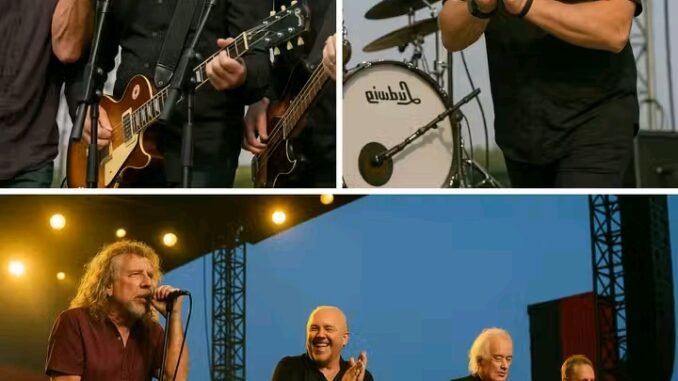
Certainly! Here’s a 600-word, five-paragraph version of your
Led Zeppelin Returns: A Legacy Rekindled
It finally happened—Led Zeppelin is back, and the world is still catching its breath. For 27 years, fans held on to hope, whispers, and rumors, never truly knowing if the titans of rock would stand together once more. Then came the moment—without warning, without apology—they stormed the stage. Robert Plant, Jimmy Page, and John Paul Jones emerged from the shadows, older perhaps, but radiating the same mystique and raw power that defined an era. The opening notes of Kashmir sliced through the air like lightning across a stormy sky, and the crowd—tens of thousands deep—erupted into screams, sobs, and stunned silence. This wasn’t just a concert; it was a resurrection.
From the first thunderous riff, it was clear that time had done nothing to dull the blade. Plant’s voice—wiser now, with an edge of gravel earned through decades—still soared with primal majesty. Jimmy Page, a silhouette of hair and black attire, coaxed fire from his guitar with the same effortless defiance that once changed the sound of music. And John Paul Jones, as steady and enigmatic as ever, anchored every note with elegance and might. They didn’t return to simply relive past glories; they came to remind the world why their music still pulses through generations. Each chord of Kashmir felt like a time machine and a lightning bolt all at once, shaking the ground, shaking the soul.
Then came the moment that turned legend into legacy. As the lights dimmed and the beat built to a climax, Jason Bonham stepped into the sacred place once occupied by his father—the late, immortal John Bonham. The crowd seemed to inhale in unison. Then, with a single crack of the snare, the dam burst. Jason didn’t merely fill in; he channeled something divine. With every strike, he honored his father’s thunderous style while adding his own blood-born fury. It was a passing of the torch, not in ceremony but in power. Tears streamed down faces. Grown men hugged strangers. In that moment, the past and future of rock collided with an explosive clarity.
This wasn’t nostalgia—it was something more profound. Nostalgia looks back fondly, but this performance surged forward. Led Zeppelin didn’t play like a band reliving their golden days—they played like a force that had only been sleeping. Every glance between Plant and Page, every nod from Jones to Bonham, spoke of connection, of unfinished business, of a legacy too mighty to fade. The chemistry, untouched by time, burned brighter than ever. Whole Lotta Love, Black Dog, Stairway to Heaven—each one was delivered not as a greatest hit, but as a fresh anthem. The fire hadn’t died. It had been waiting.
And so, in that thunderous night, rock and roll lived again—not in museum pieces or tribute bands, but in the living breath of its kings. Led Zeppelin didn’t just return to the stage—they reclaimed it. They reminded the world that legacy isn’t just about what you leave behind; it’s about what still pulses in your veins, what still echoes in your bones. As the final notes faded into roaring applause, there was no question—Led Zeppelin is still here. Not just in the records or the memories, but in every shattered expectation and every soul they touched that night. Rock wasn’t reborn. It never died. It was simply waiting—for them.
Leave a Reply